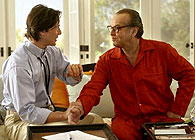|
|
|
|
Something's Gotta Give
|
 |
|
Pain,
discomfort, humiliation, embarrassment: there is never
enough of these experiences in
Although
it’s closer to an only slightly cockeyed entertainment like The Banger Sisters (2002), the film which Something’s Gotta
Give most reminds me of is James L. Brooks' brave, proudly neurotic As Good as it Gets (1997). Both films share the same great star, Jack Nicholson, in the self-mocking,
risk-taking phase of his brilliant career.
Here
Nicholson is Harry, a self-made record industry executive who has made his
fortune, and gained his street cred, from running an independent hip hop label.
His taste for much younger women, and his blasé way of justifying
this predilection, of course draw on the actor’s own public persona. But
the Jack who talks candidly in interviews of the physical aches and pains of a
man his age, and who has become the gleeful spokesperson for Viagra, also gets a
look-in here.
The
title promises the encounter of Harry’s irascible force with a suitably prim,
immoveable object – and that is incarnated in Erica (Diane Keaton), a
celebrated playwright who is taken aback when she finds her adult daughter,
Marin (Amanda Peet), frolicking with the notorious Harry. The film gingerly
sidesteps the complication of actually having these two unlikely lovers sleep
together by taking Harry to the emergency ward with the first of several heart
attack episodes.
The
central and best part of the film comes when Harry is incapacitated and only
Erica is available to nurse him back to health. Their mutual hate slowly turns
to something fonder, but with surprises and complications along the way. Harry,
as Erica has to admit to her no-nonsense sister Zoe (Frances McDormand), is a
surprisingly soulful guy. Erica finds herself loosening up in his company. But
there is also a holding-back in Harry’s behaviour – caught beautifully in the
moment when he declares to Erica, circuitously and impersonally, that she is “a
woman to love”.
Just
when you imagine Something’s Gotta Give might be winding down to an easy, happy ending, it vigorously kicks off again.
Erica’s pain and anger lead to the autobiographical catharsis of her hit play –
wouldn’t you know it, A Woman to Love – and her own dalliance with the younger generation, in the form of a gorgeous
and wholly adoring doctor, Julian (Keanu Reeves). Harry, meanwhile, stumbles
solo down various awkward paths in search of self-knowledge.
There
is much in this film that is facile and overplayed (especially the pratfalls).
But writer-director Nancy Meyers occasionally pierces the fog of generic
conventions with exchanges that are touchingly fragile and truthful. (Watch for
the careful motifs, such as the different ways that the various pairs of
characters embrace each another.) Meyers' speciality, from Baby Boom (1987) to What Women
Want (2000), has been the comedy of miscommunication and mismatching between
the sexes – kept at a light level due to the reliance on ephemeral, pop wisdom
about gender politics.
Here
Meyers outdoes Nora Ephron in marrying this superficial comedy of manners to a
genuine, indeed soulful longing for human connection that goes beyond a simple,
standard code of romance. Friendship, orgasm, ageing, commitment, pillow talk:
all the obsessions that have filled mainstream cinema and TV from Terms of Endearment (1983) to Sex in the City – not to mention a
legion of lifestyle magazines and columns – are duly dealt with by Meyers, but
with less brittleness and more heart than usual.
Something’s Gotta Give is one of those
mainstream event-films that evokes more possibilities
than it can pursue, and raises more questions than it can answer. The ending,
especially, is forced, weak and too neat. But at least Meyers dares to tread in
those grey zones of difficult emotion that too few films of this type even
acknowledge, let alone approach.
© Adrian Martin January 2004 |
![]()